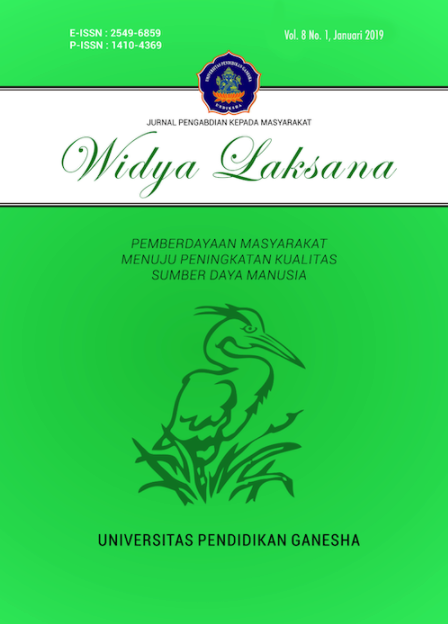SPATIAL THINKING SKILL GURU GEOGRAFI DI PROVINSI BALI
DOI:
https://doi.org/10.23887/jwl.v8i2.19162Abstrak
This Community service aims to develop a spatial thinking skills of geography teacher in the province of Bali that are designed in the form of education and training. Participants were 50 geography teachers in nine districts / cities in the province of Bali. Education and training was provided with discourse, discussion and workshop methods. An understanding of the spatial thinking skills of teachers was evaluated using a test, while for RPP it was produced using an observation sheet (APKCG modification), as well as a questionnaire to measure the usefulness of education and training. The results of the evaluation of education and training conducted indicate that: (1) The average value of Spatial Thinking Skills for senior high school Geography teachers in Bali Province is categorized very high (85.93). The implementation of the high competency spatial thinking skills is also reflected in the well-categorized of RPP (4.75); and (2) education and training to develop of Spatial Thinking skills for senior high school Geography teachers in Bali Province is considered to have a very high useful value (4.98), especially as a vehicle for the formation of spatial insights of students.
Referensi
Association of American Geographers. 2006. Spatial Thinking Ability Test (A). 1710 16th Street NW Washington DC 20009-3198.
Astawa, Ida Bagus Made. 2016. ”Tuntutan Kepada Profesionalitas Guru Geografi dalam Mencetak Generasi Ber-spatial thinking skill”. Makalah disampaikan dalam Seminar Nasional: Menggapai Pendidik Profesional yang Berkarakter dan Kreatif dalam Praksis Ilmu Ilmu Sosial dan Pembelajarnnya untuk Mencetak Generasi Cerdas dan Berdaya Saing Global. Fakultas Ilmu Sosial (FIS) Universitas Negeri Malang (UM), Kamis, 14 April 2016.
Astawa, Ida Bagus Made. 2018. ”Mengkaji Profesionalisme Guru Geografi pada Abad XXI”. Makalah disampaikan dalam Seminar Nasional: Menjawab Tantangan Profesionalisme Guru Geografi. Diselenggarakan Jurusan Pendidikan Geografi, FHIS, Undiksha, Sabtu, 3 Maret 2018.
Gerber, R. 2001. The State of geographical Education in Countries around the World. International Research in Geographical and Environmental Education. 10(5), page 349-363.
Lee J. dan Robert Bednarz, 2012. Component of spatial thinking: Evidence from a spatial thinking ability test. Journal of Geography 111(1): 15-26.
NRC (National Research Council). 2006. Learning To Think Spatially: GIS as a Support System in the K-12 Curriculum. Washington DC: National Academies Press.
Swartjes, L. dkk. GI. Learner, Creating a Learning Line on Spatial Thinking. Tersedia pada http://www.gileraner.urgent.be/wp-content/uploads/2016/05/GI-learner-SpatialThinkingReview.pdf (diakses 24 April 2017).
Yunus, Hadi Sabari. 2007. ”Konsep dan Pendekatan Geografi Acuan Khusus untuk Pengembangan Wilayah”. Makalah disajikan dalam rangka Stadium Generale Jurusan Pendidikan Geografi FIS, UNESA Surabaya, 20 November 2007
Unduhan
Diterbitkan
Terbitan
Bagian
Lisensi
Authors who publish with the Widya Laksana agree to the following terms:- Authors retain copyright and grant the journal the right of first publication with the work simultaneously licensed under a Creative Commons Attribution License (CC BY-SA 4.0) that allows others to share the work with an acknowledgment of the work's authorship and initial publication in this journal
- Authors are able to enter into separate, additional contractual arrangements for the non-exclusive distribution of the journal's published version of the work (e.g., post it to an institutional repository or publish it in a book), with an acknowledgment of its initial publication in this journal.
- Authors are permitted and encouraged to post their work online (e.g., in institutional repositories or on their website) prior to and during the submission process, as it can lead to productive exchanges, as well as earlier and greater citation of published work. (See The Effect of Open Access)



